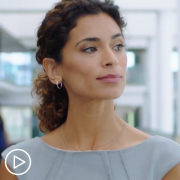MPN Patient Q&A: How Did You Cope With the Initial Shock of an MPN Diagnosis?
MPN Patient Q&A: How Did You Cope With the Initial Shock of an MPN Diagnosis? from Patient Empowerment Network on Vimeo.
A myeloproliferative neoplasm (MPN) diagnosis can come as a shock to many. Watch as MPN patient Nona shares her feelings and reaction following her diagnosis, and health advocate Dr. Nicole Rochester explains about finding reliable MPN information.
This program provides one patient’s perspective. Please talk to your own doctor to make healthcare decisions that are right for you.
See More from Best MPN Care No Matter Where You Live
Related Resources:

|

|

|
Transcript:
Dr. Nicole Rochester:
I am always talking with people about the importance of using their voice, standing up for themselves and seeking information, and asking questions. So, with that, let’s go ahead and get to our questions, the first question comes from Susan, and Susan asks, “After the initial shock of your diagnosis, were you worried about limited treatment options and specialists, and then what was your next step?”
Nona Baker:
Was I worried? Well, I was just generally anxious, because it’s this thing of not being in control of one’s body and having to surrender that control to another person. So that’s the scary bit for me, and then I did something a little bit stupid in hindsight because it was the early days of the Internet, man, I did Dr. Google, not a good plan, because particularly in the very early days, there was some really, really sort of dreadful prognosis is almost sort of go from right, you will…which, of course, here I am, 30 years on. And so, I think that I would be very cautious even now in using Dr. Google, I would go to safe sites where they are medically monitored, because I think a little knowledge can be very dangerous.
Dr. Nicole Rochester:
That is so true. And I just want to highlight that because in medicine, we often kind of jokingly talk about Dr. Google, but it really is a phenomenon. And while there’s this balance of patients with rare diseases being able to find information and empower themselves, but then as you mentioned, known a lot of the information on the Internet has not been vetted, some of it is not scientifically accurate, and it can literally have you pulling your hair out as you read these accounts and start to really create more worry as opposed to creating action stuff. So, I appreciate you sharing that.






